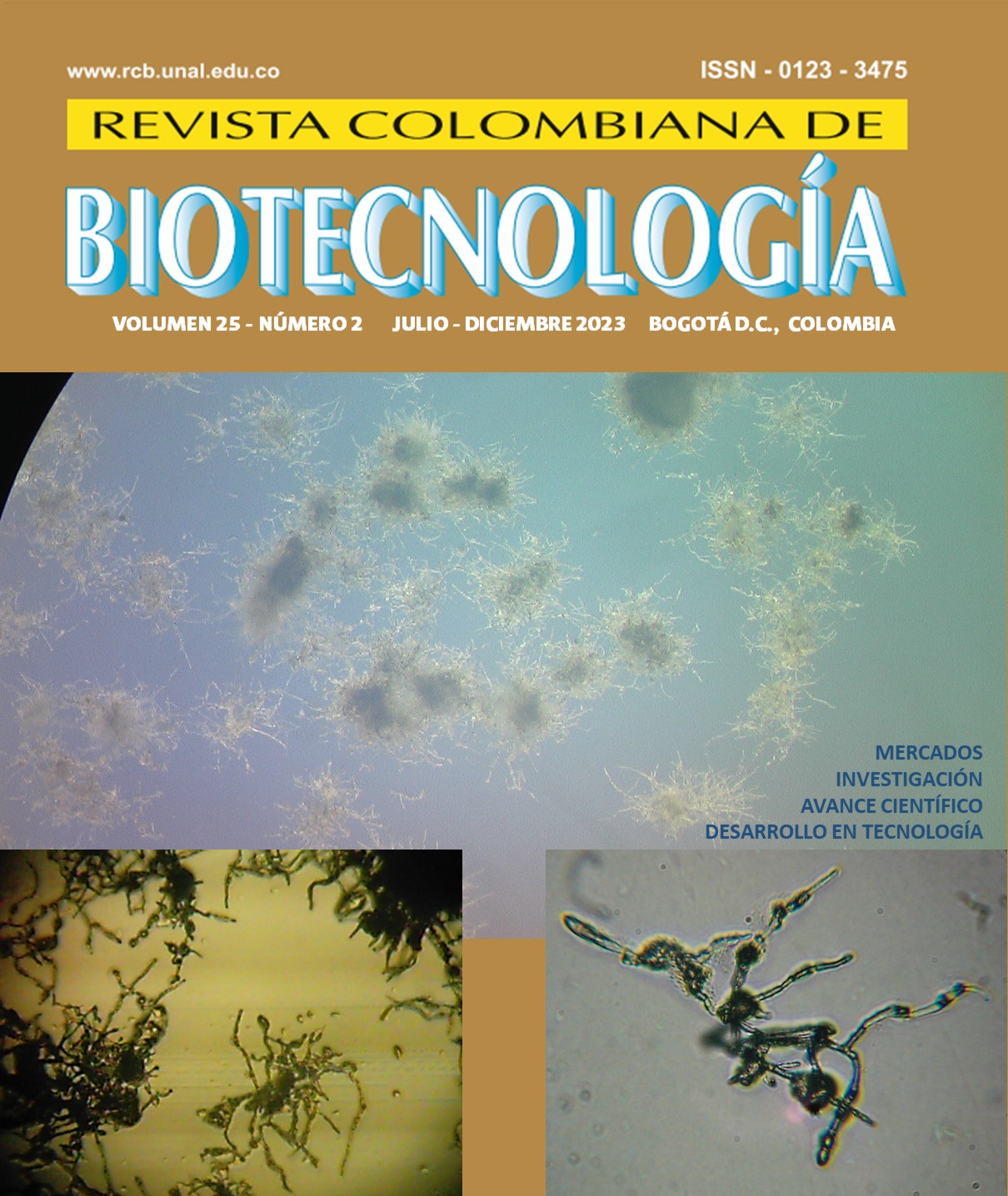Compatibilidad de un bioinsecticida a base de Beauveria bassiana con agroquímicos: efecto en la germinación y la actividad insecticida sobre Diatraea saccharalis
Compatibility of Beauveria bassiana biopesticide with agrochemicals: effect on germination and insecticidal activity on Diatraea saccharalis larvae
DOI:
https://doi.org/10.15446/rev.colomb.biote.v25n2.106635Palabras clave:
COMPATIBILIDAD, AGROQUIMICOS, CAÑA DE AZUCAR PANELERA, HONGOS ENTOMOPATOGENOS, CONTROL BIOLOGICO (es)Descargas
Los barrenadores del tallo del género de Diatraea spp. (Lepidoptera:Crambidae) han sido reconocidos por ser la plaga de mayor impacto en el cultivo de caña de azúcar, en el que causan importantes pérdidas económicas. Para su control, una cepa colombiana de Beauveria bassiana (Bals.) Vuill (aislamiento Bv062) que demostró alta virulencia frente a larvas de D. saccharalis (Fabricius), fue utilizada para el desarrollo de un bioinsecticida formulado como un concentrado emulsionable (CE). Con el fin de integrar este bioinsecticida en un esquema de manejo integrado de plagas, es necesario evaluar su compatibilidad con los agroquímicos utilizados comúnmente en el cultivo de caña de azúcar. Para tal fin se evaluó el efecto in vitro de 11 agroquímicos (fungicidas, insecticidas y herbicidas) sobre la germinación y actividad insecticida de conidios formulados. Inicialmente el CE y los agroquímicos fueron ajustados al doble de la concentración recomendada y mezclados en proporción 1:1, se incubaron durante dos horas, y se determinó el porcentaje de germinación. Los conidios expuestos a los agroquímicos fueron también purificados y utilizados para un bioensayo frente a larvas de segundo instar de D. saccharalis. El CE resultó ser compatible con los herbicidas e insecticidas evaluados, manteniendo una germinación y eficacia superior al 80%. Por el contrario, el CE fue incompatible con todos los fungicidas evaluados. Estos resultados permiten sugerir recomendaciones de aplicación del bioplaguicida a base de B. bassiana Bv062, junto con insecticidas y herbicidas empleados en el cultivo de caña, pero se recomienda no aplicarlo de manera simultánea con fungicidas como el benomil y del grupo de triazoles. Se recomienda validar estos resultados en condiciones de campo.
Sugarcane stem borers of the genus Diatraea spp. (Lepidoptera:Crambidae) have been recognized as the pest of the greatest impact on sugarcane crops causing significant economic losses. For its control, a colombian strain of Beauveria bassiana (Bals.) Vuill (code Bv062) that showed a high virulence against D. saccharalis (Fabricius) larvae was used for a biopesticide development, formulated as emulsifiable concentrate (EC). In order to include the EC into an integrated pest management (IPM) scheme, it is necessary to evaluate its compatibility with the agrochemicals commonly used in sugarcane crops. For this purpose, the in vitro effect of 11 agrochemicals (fungicides, insecticides and herbicides) on the germination and insecticidal activity of Bv062 formulated conidia was evaluated. Initially, the EC and agrochemicals were adjusted to double the recommended concentration and mixed in a 1:1 ratio. The mixes were incubated for two hours, and the germination percentage was calculated. The conidia exposed to the agrochemicals were also purified and used for a bioassay against second instar larvae of D. saccharalis. The EC was compatible with the herbicides and insecticides, maintaining germination and efficacy higher than 80%. In contrast, EC was incompatible with all the fungicides evaluated. These results allow us to suggest recommendations for the application of the biopesticide based on B. bassiana Bv062 with insecticides and herbicides used in sugarcane crops, but it is not recommended to apply it simultaneously with fungicides such as benomyl and the triazole group. It is recommended to validate these results under field conditions.
Referencias
Ali, S., Huang, Z. & Ren, S. (2013). Effect of fungicides on growth, germination and cuticle-degrading enzyme production by Lecanicillium muscarium. Biocontrol Sci Technol 23, 711–723. DOI: https://doi.org/10.1080/09583157.2013.794258
Alves, S.; Pereira, R; Tamaima, B. (2003). Use of entomopathogenic fungi in LatinAmerica. In: Advances in microbial control of insects pests, Upadhyay, R. K. ed..Kluver, New York, p. 193-211 DOI: https://doi.org/10.1007/978-1-4757-4437-8_11
Agronet (2021). Colombia es el segundo mayor productor de panela a nivel mundial con 16% de participacion. Disponible en: https://www.agronet.gov.co/Noticias/Paginas/Colombia-es-el-segundo-mayor-productor-de-panela-a-nivel-mundial-con-16-del-mercado.aspx. Consultado 09 de julio de 2022.
Amutha, M., Gulsar Banu, J., Surulivelu, T. & Gopalakrishnan, N. (2010). Effect of commonly used insecticides on the growth of white Muscardine fungus, Beauveria bassiana under laboratory conditions. J Biopestic 3, 143–146.
Barrera, G.P., Villamizar, L.F., Espinel, C., Quintero, E.M., Belaich, M.N., Toloza, D.L., Ghiringhelli, P.D., Vargas, G., (2017). Identification of Diatraea spp. (Lepidoptera: Crambidae) based on cytochrome oxidase II. PLoS One 12, e0184053. https://doi. org/10.1371/journal.pone.0184053
Barreto-Triana, N., Osorio-Mejía, P., Insuasty Burbano, O., Sarmiento-Naizaque, Z., Sandoval-Cáceres, Y., Barona-Rodríguez, A., Jiménez-Vargas, J., & Gómez-Benavides, J. (2021). Conozca a sus aliados para el manejo del barrenador Diatraea spp . en caña de azúcar para panela. (p. 60). DOI: https://doi.org/10.21930/agrosavia.nbook.7405101
Botelho A.A.A., Monteiro A (2011). Sensibilidade de fungos entomopatogênicos a agroquímicos usados no manejo da cana-de-açúcar. Bragantia, Campinas, 70 (2): 361-369. DOI: https://doi.org/10.1590/S0006-87052011000200016
Cardona, L., Soto, A., 2015. Susceptibilidad de Diatraea saccharalis (F) (Lepidoptera:Crambidae) a diferentes hongos entomopatógenos en caña panelera. Boletín científico Mus. Hist. Nat. Univ. Caldas 19, 95–103. DOI: https://doi.org/10.17151/bccm.2015.19.2.6
Celar, F. A. & Kos, K. (2016). Effects of selected herbicides and fungicides on growth, sporulation and conidial germination of entomopathogenic fungus Beauveria bassiana. Pest Manag Sci 1–8. DOI: https://doi.org/10.1002/ps.4240
Faraji, S., Shadmehri, A. D. & Mehrvar, A. (2016). Compatibility of entomopathogenic fungi Beauveria bassiana and Metarhizium anisopliae with some pesticides. J Entomol Soc Iran.
Garcia JL, Sotelo P, Monroy DM, Barrera G, Gómez-Valderrama J, Espinel C, Barreto, E. y L. Villamizar. (2018). Identification and characterization of a Beauveria bassiana (Bals.) Vuill. isolate having a high potential for the control of the Diatraea sp. sugarcane stem borer. Biotecnol Apl. 2018;35(1):1201-7.
Garcia, J.L., Gomez, J.A., Araque, G.A., Vasquez, D.F., Villamizar, L.F. (2021). Insecticidal activity and persistence of a formulation based on Beauveria Bassiana for Diatraea saccharalis control. Chilean J. Agric. Anim. Sci., ex-Agro-Ciencia 37 (3): 257-269. DOI: https://doi.org/10.29393/CHJAAS37-27AIJL50027
Garcia-Riaño, JL., Torres-torres, LA., Grijalba-Bernal, EP., Santos-Díaz, AM. (2022). In vitro compatibility with soybean agrochemicals and storage stability studies of the Beauveria bassiana biopesticide. Biocatalysis and Agricultural Biotechnology 39: 102275 DOI: https://doi.org/10.1016/j.bcab.2022.102275
Kim, J., Min, J., Bae, Y., Kim, H. (2009). Molecular Analysis of Botrytis cinerea Causing Ginseng Grey Mold Resistant to Carbendazim and the Mixture of Carbendazin Plus Diethofencarb. The Plant Pathology Journal 25 (4): 322-327. DOI: https://doi.org/10.5423/PPJ.2009.25.4.322
Lastra, L. A., & Gómez, L. (2006). La cría de Diatraea saccharalis (F.) para la producción masiva de sus enemigos naturales. Serie Técnica No. 3. Centro de Investigación de la caña de azúcar en Colombia. Serie Técnica No. 3. Cali, Colombia. 30 p. ISSN 0120-5846.
Khan, S., Bagwan, N. ., Fatima, S. & Iqbal, A. (2012). In vitro Compatibility of Two Entomopathogenic Fungi with Selected Insecticides, Fungicides and Plant Growth Regulators. Libyan Agric Res Cent J Int 3, 36–41.
Lopes, R. B., Pauli, G., Mascarin, G. M. & Faria, M. (2011). Protection of entomopathogenic conidia against chemical fungicides afforded by an oil-based formulation. Biocontrol Sci Technol 21, 125–137. DOI: https://doi.org/10.1080/09583157.2010.534548
Melo, A., Ariza, P., Lissbrant, S. & Tofiño, A. (2015). Evaluation of agrochemicals and bioinputs for sustainable bean management on the Caribbean coast of Colombia. Agron Colomb 33, 203–211. DOI: https://doi.org/10.15446/agron.colomb.v33n2.49858
Mejía, C., & Espinel, C. (2022). In vitro versus in planta : Comparing the compatibility of Akanthomyces lecanii with pesticides against Trialeurodes vaporariorum. Journal of Applied Entomology, 1–9. https://doi.org/10.1111/jen.13064
Mietkiewski, R. T., Pell, J. K. & Clark, S. J. (1997). Influence of Pesticide Use on the Natural Occurrence of Entomopathogenic Fungi in Arable Soils in the UK: Field and Laboratory Comparisons. Biocontrol Sci Technol 7, 565–576. DOI: https://doi.org/10.1080/09583159730622
de Oliveira, C., Oliveira, P. M., Neves, J., Lídio, ; & Kawazoe, S. (2003). Compatibility between the entomopathogenic fungus Beauveria bassiana and insecticides used in coffee plantations. Sci Agric 60, 663–667. DOI: https://doi.org/10.1590/S0103-90162003000400009
Parjane, N. V., Kabre, G. B., Mahale, A.S., Shejale, B.T., Nirgude, S.A. (2020). Compatibility of pesticides with Metarhizium anisopliae. J Entomol Zool Stud 8(5): 633-636.
Patil, R. K., Bhagat, Y. S., Halappa, B. & Bhat, R. S. (2014). Evaluation of entomopathogenic fungus, Nomuraea rileyi (Farlow) samson for the control of groundnut Spodoptera litura (F.) and its compatibility with synthetic and botanical pesticides. J Biopestic 7, 106–115.
Prabhu, T., Srikanth, J. & Santhalakshmi, G. (2007). Compatibility of selected pesticides with three entomopathogenic fungi of sugarcane pests. BioControl 21, 73–82.
Raj, G., Sundaram, J., Baskar, K. & Vincent, S. (2011). Compatibility of entomopathogenic fungus Beauveria bassiana (Balsamo) Vuillemin isolated from Pulney hills,Western Ghats of Tamil Nadu with insecticides. Elixir Agric 40, 5563–5567.
Rajanikanth, P., Subbaratnam, G. V & Rahaman, S. J. (2010). Compatibility of insecticides with Beauveria bassiana (Balsamo) Vuillemin for use against Spodoptera litura Fabricius. J Biol Control 24, 238–243.
Reddy, S., Reddy, M. & Pushpalatha, M. (2018). Interaction of fungicides with bio-control agents. J Entomol Zool Stud 6, 545–551.
Samuels, K. D. Z., Pinnock, D. E. & Allsopp, P. G. (1989). The potential of Metarhizium anisopliae (Metschikoff) Sorokin (Deuteromycotina: Hyphomycetes) as a biological control agent of Inopus rubriceps (Macquart) (Diptera: Stratiomyidae). Aust J Entomol 28, 69–74. DOI: https://doi.org/10.1111/j.1440-6055.1989.tb01197.x
da Silva, R., Eliane, Q., Mascarin, G., Barrigossi, J. & Liao, L. (2012). Compatibility of agrochemicals with M. anisopliae Scientia Agricola. bility Agrochem w 70, 152–160. DOI: https://doi.org/10.1590/S0103-90162013000300003
Vargas G (2015). Retos y oportunidades en el manejo de los barrenadores del tallo, Diatraea spp. Cenicaña, Serie Divulgativa No. 17, 6p. Available online on: http://www.cenicana.org/pdf/serie_divulgativa/sd_17/sd_17.pdf
Vargas, G., Lastra, L.A., Ramírez, G.D. (2018). The Diatraea Complex (Lepidoptera: Crambidae) in Colombia’s Cauca River Valley: Making a Case for the Geographically Localized Approach Neotrop Entomol 47: 395. https://doi.org/10.1007/s13744-017-0555-6
Zaki, O., Weekers, F., Thonart, P., Tesch, E., Kuenemann, P., Jacques, P., 2020. Limiting factors of mycopesticide development. Biol. Control 144, 104220. https://doi.org/10.1016/j.biocontrol.2020.104220.
Zar, J. (1999). Biostatistical Analysis. p. 663. Prentice H. New Jersey.
Cómo citar
APA
ACM
ACS
ABNT
Chicago
Harvard
IEEE
MLA
Turabian
Vancouver
Descargar cita
CrossRef Cited-by
1. Cristopher Joel Constante Cruz, Emerson Javier Jácome Mogro, Karina Paola Marin Quevedo, Victoria Alicia López Guerrero. (2025). Trampas e insecticidas en el monitoreo del gusano blanco (Premnotrypes vorax) en el cultivo de papa (Solanum tuberosum) en Cotopaxi. ConcienciaDigital, 8(3), p.210. https://doi.org/10.33262/concienciadigital.v8i3.3524.
Dimensions
PlumX
Visitas a la página del resumen del artículo
Descargas
Licencia

Esta obra está bajo una licencia internacional Creative Commons Atribución 4.0.
Esta es una revista de acceso abierto distribuida bajo los términos de la Licencia Creative Commons Atribución 4.0 Internacional (CC BY). Se permite el uso, distribución o reproducción en otros medios, siempre que se citen el autor(es) original y la revista, de conformidad con la práctica académica aceptada. El uso, distribución o reproducción está permitido desde que cumpla con estos términos.
Todo artículo sometido a la Revista debe estar acompañado de la carta de originalidad. DESCARGAR AQUI (español) (inglés).


















